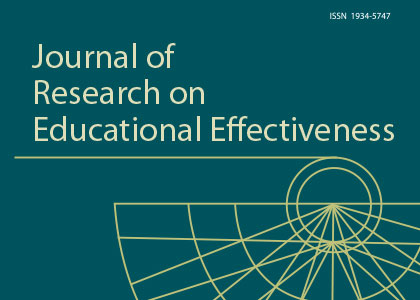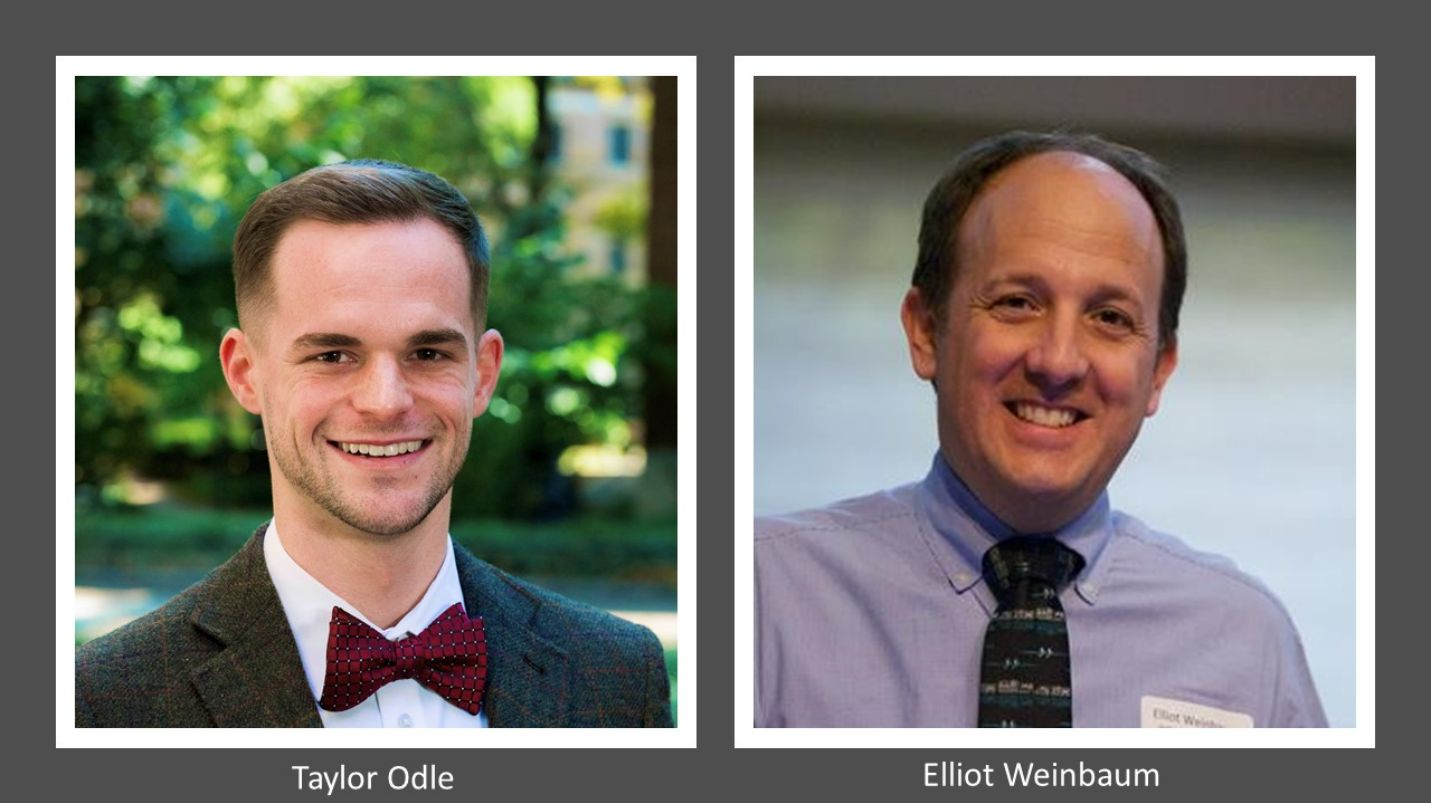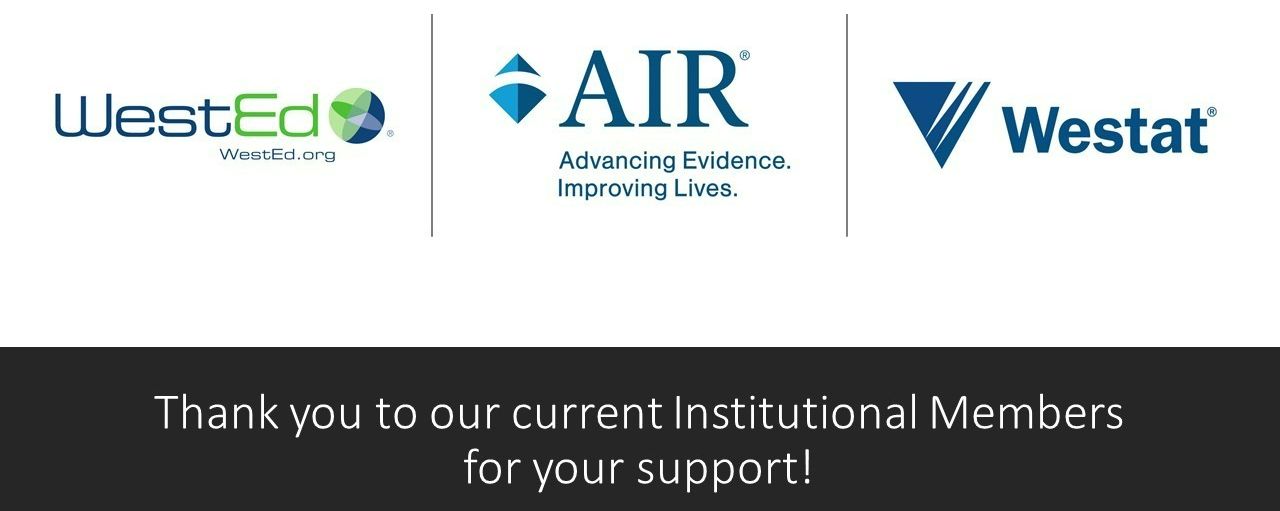
March-April 2022 Newsletter
In This Issue...
- Upcoming Events
- SREE 2022 Conference: Barbara Schneider Named 2022 Hedges Lecturer
- Open Science Updates at JREE
- Culturally Responsive and Equitable Evaluation Learning Opportunities Available
- Fourth Webinar in the Critical Perspectives in Quantitative Methods Series to be held on May 20
- Use of Research Evidence: Increase the Impact of Your Research: A Workshop Series on Strategies for Knowledge Mobilization
- SREE, in Partnership with IES, is Launching a Webinar Series on Applying Standards for Excellence in Education Research
- 2020 Summer Fellowship Now Accepting Applications
- Researcher of Color Affinity Group Highlights
- Members In The News
- Institutional Member Corner: WestEd
- On the Job Market? Check the SREE Job Board
Upcoming Events

The following events are offered at no cost to the public. Due to security and privacy reasons, registration is required to receive the link to join. Click on the links below or find more information at sree.org/webinars.
If you have questions about any of SREE's programs or events, please email [email protected].
APRIL
April 29: 12:00pm – 1:00pm ET | Culturally Responsive & Equitable Evaluation (CREE) Training Office Hour 2
MAY
May 4: 2:00pm - 3:00pm ET: Considerations for Convening Reading/Thinking/Struggling Groups
Researchers of Color workshop with Claire Mackevicius, Northwestern University
May 5: 2:00pm – 3:30pm ET | Use of Research Evidence: Increase the Impact of Your Research: A Workshop Series on Strategies for Knowledge Mobilization, Session 1
The Evidence about Evidence Use: New Findings from a National Survey of Teachers and Administrators
May 12: 4:00pm – 4:45pm ET | Sip with SREE ROC
Monthly virtual networking
May 16: 1:00pm – 2:30pm ET | Applying Standards for Excellence in Education Research, Webinar 1
Enhancing the Generalizability of Impact Studies in Education
May 19: 2:00pm – 3:30pm ET | Use of Research Evidence: Increase the Impact of Your Research: A Workshop Series on Strategies for Knowledge Mobilization, Session 2
What is Knowledge Mobilization and What Does It Look Like?
May 20: 2:00pm – 3:30pm ET | Critical Perspectives in Quantitative Methods Series: Webinar 4
A Critical Perspective on Measurement: MIMIC Models to Identify and Remediate Racial (and Other) Forms of Bias
May 26: 12:00pm – 1:00pm ET | Culturally Responsive and Equitable Evaluation (CREE) Training Office Hour 3
JUNE
June 2: 2:00pm - 3:30pm ET | Use of Research Evidence: Increase the Impact of Your Research: A Workshop Series on Strategies for Knowledge Mobilization, Session 3
Actionability and Compatibility: Meeting the Research Needs of Educators
June 7: 1:00pm – 4:00pm ET | CREE Training Part 2: Advancing the Data Equity Framework (Workshop 1 of 2)
June 13: 1:00pm – 2:30pm ET | Applying Standards for Excellence in Education Research, Webinar 2
The BASIE (BAyeSian Interpretation of Estimates) Framework for Interpreting Findings from Impact Evaluations
June 14: 1:00pm – 4:00pm ET | CREE Training Part 2: Advancing the Data Equity Framework (Workshop 2 of 2)
June 16: 2:00pm – 3:30pm ET | Use of Research Evidence: Increase the Impact of Your Research: A Workshop Series on Strategies for Knowledge Mobilization, Session 4
Leveraging the Intermediary Space: Connecting with Influential Organizations to Expand Your Reach
SEPTEMBER
September 21 – 24 | SREE 2022 Annual Conference
From Reckoning to Racial Justice: Centering Underserved Communities in Research on Educational Effectiveness

Barbara Schneider Named 2022 Hedges Lecturer

SREE is pleased to announce that Barbara Schneider, John A. Hannah University Distinguished Professor in the College of Education and the Department of Sociology, Michigan State University, has been named the 2022 Hedges Lecturer. Schneider was selected for her ability to collaborate across research fields, consistent use of robust evidence, and passion for good research in service to schools and communities, which inspires students and early career researchers.
The lecture bears the name of Larry Hedges to honor his work in advancing research methods in education and social science and his part in founding the Society, which supports continuous improvement in the field. It is supported by the American Institute for Research, the Spencer Foundation, and the W.T. Grant Foundation. 2022 is the fifth year the Hedges Lecture will be given.
The Hedges Lecture will take place on September 22 at the Renaissance Arlington Capital View Hotel as part of SREE’s Annual Conference. Learn more about the SREE 2022 Conference here. Program information for the conference will be available June 15.
Open Science Updates for JREE (Effective April 1, 2022)

JREE supports the movement in the scientific ecosystem toward empirical research that is more transparent, open, and reproducible. Consistent with JREE’s values, JREE's editors' view that open science facilitates the alignment of scientific practice with scientific ideals, accelerates scientific discovery, broadens access to scientific knowledge, and improves the credibility of empirical research on the effectiveness of educational interventions. To operationalize this support of open science, JREE is a signatory of the TOP Guidelines: a set of modular standards for moving published empirical research toward greater openness.
As of April 1, 2022, JREE is a “Level 1” implementer of all standards in the TOP Guidelines. As a “Level 1” implementer, JREE requires authors to disclose whether or not they have used open science practices in the TOP Guidelines. The JREE editors recommend (but do not require) that authors use these open science practices, when possible. To implement this policy, authors of all accepted manuscripts will be required to complete and submit a TOP Guidelines Disclosure Form as a condition of publication, in which authors will disclose whether or not their study included the following open science practices codified in the TOP Guidelines:
- Study and Analysis Plan Registration: whether or not the study was registered—and, if so, whether the registration was prospective and included an analysis plan. Examples of independent, institutional registries include the Registry of Efficacy and Effectiveness Studies and OSF Registries.
- Data, Code, and Materials Transparency: whether or not the data, code, and other materials (e.g., questionnaires, surveys, instructions) used to conduct the research are publicly available—and, if available, where and how to access them. Please use these templates to develop these availability statements.
- Citation Standards: citation of data, code, and other materials in-text and in the references section, if possible. Please use this style guide for formatting in-text citations and reference section entries. We recognize some data, code and materials are not citable.
- Design and Analysis Reporting Guidelines: for randomized trials, systematic reviews, and meta-analyses, authors are encouraged to use the following checklists to write their manuscripts prior to submission to the journal. These checklists will help JREE ensure consistency in the evaluation of submitted work:
- Publication Bias: confirmation that the manuscript is an honest, accurate, and transparent account of the study being reported.
- Replication: indication of whether the study is a replication of a previous study—and, if so, provide a citation to that study.
JREE welcomes replication studies as well as papers with strong methods that find null or negative results.
The TOP Guidelines Disclosure Form and relevant checklists (if applicable) are required at the revise and resubmit stage and should be uploaded as “Supplementary Material for Review.” Retroactive forms for content already published or in production will not be accepted. If you submit a TOP Guidelines Disclosure Form, please be aware that anonymity cannot be guaranteed during peer review.
JREE has created a list of resources for authors and SREE members who would like to learn more about the open science practices in the TOP Guidelines.
Authors with any questions about JREE’s open science policies should email [email protected].
Culturally Responsive and Equitable Evaluation Learning Opportunities Available
In 2022, SREE is pleased to build upon the Culturally Responsive & Equitable Evaluation (CREE) training it offered last fall and offer opportunities for those who wish to take the introductory workshop as well as those ready to diver deeper.
Culturally Responsive and Equitable Evaluation Workshop Office Hours: April 29th and May 26th at 12 PM ET
Did you miss the fall training and would like to learn about CREE? Watch the workshop recordings here and then engage in live office hours with SREE’s training partner, We All Count. During the 3-part training, researchers learned how to make their research and evaluations more culturally responsive, inclusive, and equitable. The workshop included steps researchers can take at every stop of the research process-from formulation of the research question through dissemination. If you know that you want to take the deeper dive, be sure to complete the workshop prior to June! Register here for the upcoming office hour on April 29.
CREE Training Part 2: Advancing the Data Equity Framework: June 7 & June 14 from 1:00pm - 4:00pm ET
This live, online workshop is designed for people who have completed the Foundations of Data Equity (CREE Training) workshop. We will dive deeper into the nuances of how to apply the Data Equity Framework to your work as well as look at a wider variety of potential applications. Registration information will be provided in May.
Community of Practice
SREE is pleased to be forming an online community of practice that is currently in the works. Please stayed tuned to your email for more information.
Fourth Webinar in the Critical Perspectives in Quantitative Methods Series to be held on May 20
May 20: 2:00pm – 3:30pm ET
A Critical Perspective on Measurement: MIMIC Models to Identify and Remediate Racial (and Other) Forms of Bias
Speakers: Matt Diemer, University of Michigan and Aixa Marchand, Rhodes College
The quantitative methods on which members of the educational research community often rely have a troubling history, with their application sometimes being used to reify rather than combat societal inequities. We recognize an overdue need to investigate and foster in our research communities’ perspectives, strategies, and tools to promote research that is culturally responsive and that works toward the goal of equity in education along dimensions of race, socioeconomic status and gender, among others. SREE is pleased to announce a webinar series on critical perspectives in quantitative methods that is open to the public. The co-sponsors for this webinar series include the Association for Education Finance and Policy (AEFP), the American Educational Research Association – Division L, and the Council on Public Policy in Higher Education (CPPHE), a Council of the Association for the Study of Higher Education (ASHE).
This fourth webinar in the series will focus on sound measurement that is foundational to quantitative methodology. Despite the problematic history of measurement, it can be repurposed for critical and equitable ends. MIMIC (Multiple Indicator and MultIple Causes) models simply and efficiently test whether a measure means the same thing and can be measured in the same way across (e.g., racial/ethnic and/or gender) groups. This talk considers the affordances and limitations of MIMICs for critical quantitative methods, by detecting and remediating racial, ethnic, gendered, and other forms of bias in items and in measures.
To date, three webinars have been held. Information on previous and upcoming webinars can be found here.
Use of Research Evidence: Increase the Impact of Your Research: A Workshop Series on Strategies for Knowledge Mobilization
Increase the Impact of Your Research: Strategies for Knowledge Mobilization is a workshop series for the SREE community, academic researchers, private research staff, and graduate students interested in making their work impactful, usable, accessible, and engaging to practitioners and policymakers. Through case studies and surveys from nearly 4,500 educators and 350 education researchers nationwide, the Center for Research Use in Education (CRUE) has found that researchers whose work has the most salient impacts on policy and practice tend to collaborate with schools and districts, they leverage intermediary organizations to connect their research with practice communities, and they use multifaceted and targeted dissemination strategies. Through four sessions facilitated by CRUE staff, participants will learn how to achieve greater impact based on findings from our studies and specific advice from researchers and practitioners at the forefront of connecting research, practice, and policy. Sessions will cover topics key to effective knowledge mobilization and engagement with non-academic audiences, including school/district and intermediary stakeholders.
Workshops will be highly participatory and will provide practical knowledge, skills, and tools that can be used right away. Join us online this spring for one or multiple sessions!
Upcoming workshops in the series include:
Session 1: May 5, 2:00pm – 3:30pm ET
The Evidence about Evidence Use: New Findings from a National Survey of Teachers and Administrators
Session 2: May 19, 2:00pm – 3:30pm ET
What is Knowledge Mobilization and What Does It Look Like
Session 3: June 2, 2:00pm – 3:30pm ET
Actionability and Compatibility: Meeting the Research Needs of Educators
Session 4: June 16, 2:00pm – 3:30pm ET
Leveraging the Intermediary Space: Connecting with Influential Organizations to Expand your Reach
Detailed information on each session can be found on our website. Register here for the first session on May 5. Contact [email protected] for more information.
SREE, in Partnership with IES, is Launching a Webinar Series on Applying Standards for Excellence in Education Research
The Institute for Education Sciences (IES) has launched the Standards for Excellence in Education Research (SEER) to make education research more transparent, actionable, and focused on consequential outcomes. To support this effort, IES is producing a series of practical guides for researchers on how to implement SEER to improve the quality and relevance of their studies.
SREE is excited to partner with IES to sponsor two upcoming webinars that each cover the recommendations from a specific guide aligned with the SEER. These webinars are free, open to the public, and relevant to all researchers who seek to ensure their studies are useful to policymakers and educators.
Enhancing the Generalizability of Impact Studies in Education will be held on May 16, 1:00pm - 2:30pm ET and The BASIE (BAyeSian Interpretation of Estimates) Framework for Interpreting Findings from Impact Evaluations will be held on June 13, from 1:00pm – 2:30pm ET.
Detailed information on each webinar can be found on our website. Register here for the first session on May 16.
2022 Summer Fellowship Now Accepting Applications
SREE, in collaboration with EdFunder’s LEAD Impact Group, is pleased to offer the SREE Summer Fellows Program again this year. The purpose of this program is to connect educational researchers with philanthropic organizations seeking research information without having the time or expertise to access it and, in doing so, advance the use of high-quality education research. SREE student members will have the opportunity to spend the summer working on a 'real world' research project answering a question that the philanthropic community is asking to help inform their work.
Applicants should have completed at minimum one year (preferably two years) of graduate studies. Individuals who complete(d) their graduate studies in 2022 are eligible to apply. The fellowship is open to current SREE student members.*
Submit your application and find more information on this year's projects here.
2022 Program Timeline:
April 12 – 29: Fellowship applications accepted
May 2 – 9: Applications reviewed, semi-finalists selected
May 12 – 17: Interviews
May 19 – 20: Finalists notified
June 1 – Sept 2: Fellowship research period
*If the membership fee poses a financial hardship, please contact Ellen Weiss at [email protected].
Researchers of Color Affinity Group Highlights
The Researchers of Color affinity group will be hosting an upcoming workshop titled, Considerations for Convening Reading/Thinking/Struggling Groups on May 4, 2:00pm - 3:00pm ET. This session, led by Claire Mackevicius of Northwestern University, will provide an opportunity for people to plan how to help organize, convene, and support reading/thinking/struggling groups especially centered on topics relegated to margins of mainstream academic (particularly quantitative education research) spaces. Following a brief presentation of some considerations people might engage in before establishing a group, participants will put workshop material into practice around a brief pre-reading, Coalitional Refusal in a Neoliberal Academy (Gonzales & Shotton 2022), by engaging in reflections and exercises that will concretize how to commit to action going forward. This workshop is open to all and made possible thanks to the support of the Spencer Foundation. Register here.
You are also welcome to join the Researchers of Color on the second Thursday of each month at 4:00pm ET for SIP with SREE-ROC online networking. Researchers of color and allies are invited to network, collaborate, ask questions, and connect with one another. Register here to receive the link to join. The link remains the same for each month, so you only need to register once.
SREE-ROC is an interdisciplinary collective of researchers of color who develop and implement rigorous methodology for evaluating education policy. Our mission is to create spaces for community, professional development, and networking among researchers of color who are part of the larger SREE community. This mission is an expression of SREE’s commitment to nurturing a research community representative of the populations it serves as a critical and often overlooked element of rigor in the field.
Members In The News

Taylor Odle
Taylor Odle, a 2020 SREE Summer Research Fellow and current SREE member, recently defended his dissertation (Three Essays in Economics, Education Policy, and Inequality) at the University of Pennsylvania. This fall, he will join the Department of Educational Policy Studies at the University of Wisconsin-Madison as an assistant professor. Taylor’s research broadly concerns the economics of higher education, with a specific focus on testing mechanisms to reduce inequalities along the college-going pipeline.
Elliot Weinbaum
The William Penn Foundation announced that Elliot Weinbaum will assume the role of Chief Philanthropy Officer. As Chief Philanthropy Officer, Weinbaum will oversee an annual grant budget of more than $120 million and will lead the Foundation’s core grantmaking activities. He will work with staff in the Creative Communities, Great Learning, and Watershed Protection programs to identify innovative new streams of work, advance cross-programmatic opportunities, and ensure impactful grantmaking. Read more here.
Institutional Member Corner: WestEd

New Era for Leadership and Innovation: Dr. Marianne Perie Joins WestEd to Lead Assessment Research
Dr. Marianne Perie is Director of Assessment Research and Innovation at WestEd where she will significantly shape psychometric and assessment research and provide deep measurement expertise that draws on her experience improving education equity through high-quality research.
“Dr. Marianne Perie is a nationally respected psychometrician who has helped more than a dozen states develop and implement fair, valid, and innovative systems of assessment,” says WestEd Senior Managing Director Andy Latham. “Her intellectual leadership, combined with her passion for equity and opportunity for all students, will ensure new research insights for the field that help improve student outcomes.”
To get the latest information on WestEd’s work in research, evaluation, assessment and more, subscribe to our E-Bulletin newsletter—and follow us on LinkedIn, Twitter, and Facebook.

Job Board
| |
Evaluation Researcher
The Mary E. Walsh Center for Thriving Children (CTC) at Boston College - Chestnut Hill, MA
Full-time
|
Posted: Apr 14, 2022
Application Deadline: N/A
|
|









